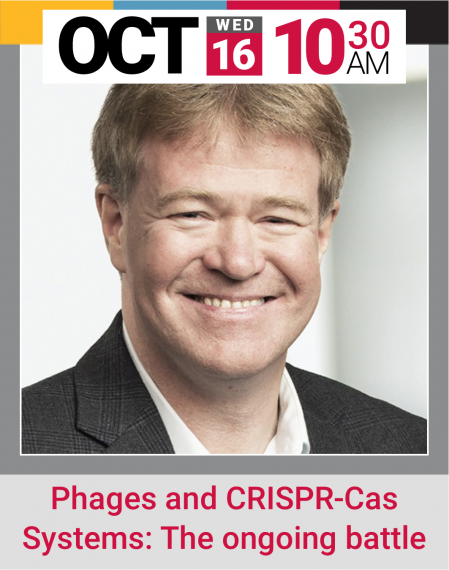MCB Distinguished Speaker Series: Dr. Sylvain Moineau
Date and Time
Location
SSC 2315

Details
Dear Colleagues,
Please join us as we welcome Dr. Sylvain Moineau as part of MCB's Distinguished Speaker Series on Wednesday, October 16th, 2019.
Seminar time: 10:30 AM
Room: SSC 2315
All are welcome to attend. Please see poster for further details.
Sincerely,
MCB Distinguished Speaker Seminar Committee
Title:
Phages and CRISPR-Cas Systems: The ongoing battle
Abstract:
Fighting viruses is no easy task. Bacterial cells have survived phage attacks by evolving sophisticated defence strategies that enable them to thrive even in virus-rich ecosystems. CRISPR-Cas is one of these mechanisms used by microbes to protect against viral infection. Bacterial CRISPR-Cas type II systems function by first incorporating short DNA ‘spacers’, derived from invading defective phage genomes, in the CRISPR array located in their genome. The bacterial CRISPR array is then transcribed and matured into short RNAs, which, by recruiting Cas9 endonuclease, act as surveillance complexes that recognize and cleave subsequent invading matching DNA sequences. The cleavage occurs near a short motif, called the PAM, adjacent to the sequence targeted by the spacer.
Phages have evolved counter-tactics to thwart such mechanisms, leading to a so-called biological arms race. For example, phages can bypass CRISPR immunity through point mutation or deletion of the CRISPR target or PAM in their genome as well as by the production of anti-CRISPR proteins (ACRs).
Using the Gram-positive dairy bacterium Streptococcus thermophilus as a model, this presentation will recall the roles played by virulent phages in the understanding of CRISPR-Cas systems as well as in the development of industrially relevant phage-resistant bacterial strains. I will also highlight the recent discovery and characterization of two families of ACRs from S. thermophilus phages. The emergence of ACR-containing phages illustrates that novel approaches are needed to control phages in industrial settings.